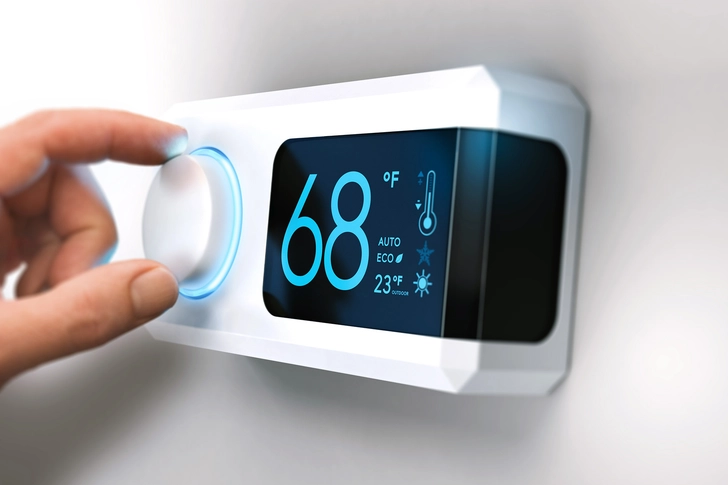- Headaches Overview
- Migraine
- Cluster & Tension Headaches
- Other Types of Headaches
- Appointment Prep
- View Full Guide
Fixing Your Sleep with Migraine and Perimenopause/Menopause: 7 Tips and Tricks



How Migraine and Hormones Harm Sleep
When your hormones shift during perimenopause and menopause, sleep can become a nightmare. You could struggle to drift off, wake up drenched from night sweats, or toss and turn, unable to fall back asleep. Living with migraine adds to the challenge of getting a good night’s sleep, but a nightly struggle doesn’t need to be your new normal. Here’s what can help.

Why Sleep Matters With Migraine
We all need sleep to survive, but sleeping well plays a key role in managing migraine. Some experts think that migraine is linked to your circadian rhythms, your body’s internal 24-hour clock. When your sleep habits are strong, you may be less likely to have a migraine episode. On the other hand, not getting enough quality sleep could trigger a migraine.

Set Yourself Up for Sleep Success
Your body thrives on routine, so try to go to bed and get up at the same time every day, even if you didn’t sleep well the night before. Create a relaxing routine before bedtime, like taking a long shower or listening to calming music. You’ll sleep best in a room that’s quiet, cool, and dark. You could even sleep with the ear plugs or eye mask you may already use for a migraine episode.

Watch What You Drink
If you’re sensitive to caffeine, cut out coffee, tea, energy drinks, and soda as early as noon. Caffeine stays in your system for up to 4½ hours. Stop drinking alcohol at least 3 hours before bed. It may make you drowsy, but it can interrupt your sleep cycle and keep you from reaching the deep sleep your body needs. Try to sip no more than one glass of water in the 2 hours before bed so you don’t need to wake up to use the bathroom.

Manage Night Sweats
When hormone changes crank your body temperature too high, your body sweats to bring it back down. To try to prevent these uncomfortable night sweats, sleep with a fan or next to an open window. Wear loose-fitting, lightweight pajamas. Use a pillow that contains cooling gel, and choose light blankets for your bed that you can easily remove. Keep an ice pack by your bed, as well as a glass of water, to use if a night sweat does strike.

Wind Down Before Bed
Feeling overstimulated before bed can make it hard to sleep. Skip high-impact evening workouts and try to exercise earlier in the day. Avoid tobacco before bedtime, since nicotine is a stimulant. And cut back on intense TV shows that put your body on high alert. Research has also linked binge-watching to insomnia and poor sleep quality.

Talk About Treatments
Talk to your doctor about supplements or medications that could help. Sleep aids can only offer quick short-term relief and can’t help with hormone levels or migraine. Melatonin, a natural “sleep” hormone, may help sync your circadian rhythms. Some research shows that it could also play a role in preventing migraine attacks. Another option is hormone therapy, which can improve your menopause symptoms so you can sleep.

Combat Nighttime Anxiety
You’re more likely to have anxious thoughts when you live with migraine or go through perimenopause or menopause. If you wake up with your mind racing, calm your nervous system by taking two short breaths through your nose, then one long breath out of your mouth. Progressive muscle relaxation, where you tense, then relax, one muscle group at a time, can also help. Still awake after 20 minutes? Get up and write down what’s on your mind.

When to Get Help
Managing both migraine and menopause can be a challenge, but you don’t have to figure it out on your own. If you try the above tips and a lack of sleep still gets in the way of your daily life, talk to your doctor. They’ll get to the root cause of your issues and offer some steps you can take to sleep soundly again.
IMAGES PROVIDED BY:
- The Image Bank/Getty Images
- Martin Broz/Getty Images
- iStock/Getty Images
- Thomas Barwick/Getty Images
- iStock/Getty Images
- Getty Images
- Moment/Getty Images
- iStock/Getty Images
- E+/Getty Images
SOURCES:
SWAN Study: “Effects of Sleep Problems During Menopause.”
Cleveland Clinic: “Does Menopause Cause Insomnia and Sleeplessness,” “Night Sweats,” “Full-Proof: Explaining How Alcohol Can Interfere With Sleep,” “Can Menopause Cause Anxiety?” “When You Should See a Doctor About Menopause (or Perimenopause) Symptoms,” “Is It Healthy To Drink Water Before Bed?”
Baylor College of Medicine: “Can eating or drinking caffeine before bed impact your health?”
The Migraine Trust: “Migraine and sleep.”
Journal of Clinical Sleep Medicine: “Binge Viewing, Sleep, and the Role of Pre-Sleep Arousal. Journal of clinical sleep medicine.”
Mayo Clinic Health System: “Sleep is the foundation for healthy habits.”
Association of Migraine Disorders: “The Link Between Migraine and Anxiety.”
Integris Health: “Why Is Anxiety Worse at Night?”
National Headache Foundation: “Sleep and Migraine: Episode 220/”Sleep and Its Impact on Migraine.”
Endocrine: “Efficacy of menopausal hormone therapy on sleep quality: systematic review and meta-analysis.”